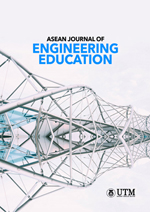Relevance of Strategically Planned Engineering Education for Sustainable Development
DOI:
https://doi.org/10.11113/ajee2020.4n1.16Keywords:
Engineering Education, Sustainable Development, Education Strategic Plan, Education Transformation, Education ManagementAbstract
Every nation is paying attention to and strategically improving SDG-4 (Quality Education) itself and using it as a tool for fulfilling other related SDGs. Today, engineering education plays a vital role in implementing a significant portion of SDGs and thus strategic plan for engineering education also becomes important. Although many of existing works have focused on how to implement SDGs through education, there are very few works which study on the relevance of educational strategic plan for SDGs.
The objectives of this paper are to review how higher education, which includes engineering education, is strategically planned in a National Education Strategic Plan and to analyse which strategies support other SDGs in addition to SDG-4. As a case study, the review is conducted for Myanmar NESP (2016-2021). By means of questionnaires, a total of 240 institute/university heads of departments/deans, teachers/lecturers and students from fifteen different universities are surveyed to explore relevance of NESP for other SDGs in addition to SDG-4.
First, according to intuitive analysis, it finds that Myanmar NESP strategies for higher education support SDG-6, SDG-7, SDG-8, SDG-9, SDG-13, SDG-14, SDG-15 and SDG-17 in addition to SDG-4. It is agreed and verified by survey results. The survey results show that in addition to SDG-4, NESP can support SDG-9 in second place, SDG-11 in third place, SDG-6 in fourth place, SDG-7 and SDG-17 in fifth place. More than 95% agree to strategically include the concept of sustainable development in university curriculum. A total of six potential recommendations are made to be considered in developing a NESP in the future. These are (1) to have policy/strategy for inclusion of SD concept as an elementary course in universities, (2) to increase policy/strategy for promoting STI through research, (3) to have policy/strategy for promoting “Education for SD” in teacher education, (4) to increase policy/strategy to promote SD through campus operation, (5) to have policy/strategy for promoting technological entrepreneur (techno-preneur) (6) to have policy/strategy for initiating graduate programs in “Sustainable Development” in universities.


















